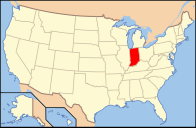Indiana Democrats block session to halt labor bill
Friday, January 6, 2012
Indiana’s Democratic Caucus continued to deny the Republican-controlled state legislature with the quorum necessary to conduct business in the 2012 legislative session and move forward on a controversial "right to work" bill, which both Governor Mitch Daniels and fellow Republican legislators have made their top priority.
A "right to work" law would bar employers from signing agreements with labor unions that make membership or due payments by workers mandatory. Unions claim this is an effort to weaken collective bargaining and would lead to lower wages and contribute to poor working conditions. Proponents of the law say it would make the state of Indiana competitive with the 22 other states that already have such a law.

Image: Scott5114.
The 2012 session in Indianapolis never got under way on Wednesday, because House Democrats kept enough of its members away from the chamber. Instead the Democrats caucused in a lengthy, private 4-hour meeting on the first day in an attempt to reach a consensus on their approach. The Democrats continued to hold their ground on the second day and House Minority Leader B. Patrick Bauer, Democrat-South Bend, offered to return if the Republicans approved of holding more public hearings across the state before bringing the issue up again.
But House Speaker Brian Bosma, Republican-Indianapolis, dismissed Bauer's offer as a stalling tactic. The Republicans hold a decisive majority in both the House and Senate of the Indiana state legislature, and as a minority the Democrats have limited means to block votes that are by party line.
Last year, Democrats, faced with the same disadvantage, fled Indiana for Urbana, Illinois, and disrupted the 2011 session for five weeks.
While the Indiana legislature was stalled in 2011, Wisconsin passed a controversial measure to limit the collective bargaining rights of government employees, which led to large-scale protests there. Wisconsin Democrats have since organized recall elections, including an effort to recall Governor Scott Walker.
Also in 2011, the Ohio legislature passed collective bargaining limits, which were later repealed by voters in a November referendum.

Image: BirchallDanny.
After last year's walkout in Indiana, the Republicans passed "anti-bolting" rules, which could fine absent elected office holders $1,000 per day for absenteeism. Anti-bolting refers to walkouts that are meant to shut down operations by preventing a quorum.
HAVE YOUR SAY
|
|
Should Indiana lawmakers pass a right to work law or reject it?
| |
Union members showed up for the Indiana session on opening day in order to voice their opposition to "right to work" legislation. The Daniels administration had initially called for a capacity limit of 3,000 of the Capitol building for security reasons, but the Governor back away during the day. The union protesters returned on the second and third day holding signs and making their presence known throughout the building.
The next public meeting on the law took place Friday when lawmakers from both the House and Senate held one combined hearing for both bills. A joint hearing is rarely done but in this case speeds up the process. The Friday morning hearing could pave the way for a vote in the Senate, but House Democrats could still prevent a vote by staying away from the House floor. To gain the quorum necessary for a vote, the Republican House majority would need two thirds present, or 67 of the lawmakers of 100 total members, and the House Republicans have only 60 members. Bosma could impose the fines of $1,000 a day to end the Democrats' action and gain the quorum.
Sources
- Eric Bradner. "Indiana legislators poised for right-to-work action" — Evansville Courier & Press, January 6, 2012
- Mary Beth Schneider. "Rare joint hearing accelerates 'right to work' bill" — The Indianapolis Star, January 6, 2012
- Tim Jones. "Indiana Republicans Pick Fight With Unions Where Others Don’t Dare" — Bloomberg Businessweek, January 6, 2012
- Tom Bianco and Tom Davies (Associated Press). "Ind. House Democrats stall session over labor bill" — Boston.com, January 5, 2012
- Katie Delaune. "Jeffersonville lawmaker in the middle of right to work fight" — WDRB, January 5, 2012
- Tom Davies and Tom LoBianco (Associated Press). "Ind. House Democrats stall session over labor bill" — Houston Chronicle, January 5, 2012
- Eric Bradner. "Indiana House Dems skip first day of Legislative session" — Evansville Courier & Press, January 4, 2012
- Niki Kelly. "Democrats refuse to take floor at Statehouse" — The Journal Gazette, January 4, 2012
- Mary Beth Schneider. "House Democrats roll out stall tactic at the start" — The Indianapolis Star, January 4, 2012
- Mary Beth Schneider and Chris Sikich. "Gov. Daniels lifts strict security measures at Statehouse" — The Indianapolis Star, January 4, 2012
External links
- Senate Bill 269
- House Bill 1001
- "Save Hoosier Families" is a TV and radio ad sponsored by the AFL-CIO
- Governor Mitch Daniels on right to work is a TV and radio ad sponsored by the Indiana Opportunity Fund Inc.
- House Speaker Brian Bosma on right to work


